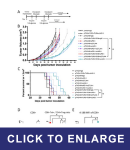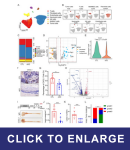Letter from the Editor | JITC Editor Picks | Cancer Immunotherapy MonthTM| Popular Archive Articles
Letter from the Editor
Hello JITC Readers,
It is with immense pleasure, humility, and gratitude that I welcome you to this month’s JITC Digest, the first in my role as Editor-in-Chief of JITC. I am honored to be at the helm of this incredible journal and look forward to working with our editors, authors, reviewers, and readers as we embrace the exciting future ahead.
Firstly, I need to extend a special thank you to Dr. James Gulley for his stewardship while serving as Interim Editor-in-Chief over the last 15 months. He has been a tremendous help and resource during this transition of leadership, and I have been truly appreciative of his guidance as I learn the ropes at JITC. I am also grateful to have Dr. Sjoerd van der Burg serving as our Deputy Editor-in-Chief. We encourage you to read our recently published editorial in which we outline our vision for JITC and its role in accelerating scientific advancement in the field. Furthermore, the remarkable success of our Journal has to acknowledge not only the great progress in the field but the sound and unwavering development of our founding Editor, Dr. Pedro Romero.
As we reflect on where the field is heading, we also note that June is Cancer Immunotherapy MonthTM, and with that an opportunity to help promote awareness of the cancer immunotherapy field. As SITC celebrates the month, please consider taking part in the educational and professional development opportunities offered by the society.
As part of Cancer Immunotherapy MonthTM, I would also like to call special attention to the position papers and guidelines JITC publishes that provide guidance to enhance clinical decision making in the field. View the collection of these articles that includes SITC’s clinical practice guidelines. Furthermore, for those interested in weighing in, we are inviting commentary on what are the essential biomarkers that should be part of every early phase clinical trial in immuno-oncology.
Beyond the guidelines, there are numerous highlights each month published across all sections of JITC. Donghwan Jeon et al examined whether addition of immune checkpoint blockade to an antitumor vaccine and toll-like receptor (TLR) agonism treatment regimen could improve antitumor responses. Their study suggests that optimal combinations of TLR agonists and immune checkpoint blockade could lead to improved efficacy of human anticancer vaccines. Elsewhere, Noam Levin and colleagues demonstrate that their neoantigen-specific stimulation method, “NeoExpand”, could improve the effectiveness of adoptive cell therapies, warranting clinical evaluation. Read these recent articles and others below.
I thank you all for the opportunity to lead JITC. I am humbled to serve as Editor-in-Chief and look ahead with excitement as we advance these novel therapies for patients with cancer, and investigate and understand the complex biology underlying their success.
Regards,
Michael T. Lotze, MD
Editor-in-Chief
Journal for ImmunoTherapy of Cancer
JITC Editor Picks
|
Combining toll-like receptor agonists with immune checkpoint blockade affects antitumor vaccine efficacy
|
|
Donghwan Jeon, Ethan Hill, Jena E Moseman, Douglas G McNeel
Journal for ImmunoTherapy of Cancer 2024;12:e008799 (3 May 2024)
RESEARCH

Summary:
T cell activation relies on many signaling receptors, including antigen receptors, checkpoint receptors, and toll-like receptors (TLR). Antitumor vaccines utilize antigen signaling to stimulate T cell activation and mount an anti-tumor response. Previous work demonstrated that combining antitumor vaccination with TLR3 and TLR9 agonists in mice improved anti-tumor responses. It is well established that immune checkpoint blockade can also improve T cell antitumor efficacy. Thus, this study examined whether addition of immune checkpoint blockade to the antitumor vaccine and TLR agonism treatment regimen would further improve antitumor responses. Using murine tumor models, the combination of TLR agonists and α-CTLA-4 or α-LAG-3 delivered with vaccines led to improved antitumor responses. Interestingly, when TLR agonists were combined with α-PD-1 instead, the same effect was not observed due to regulatory T cell activation. These data suggest that the optimal combinations of TLR agonists and immune checkpoint blockade may be an effective method to improve the efficacy of human antitumor vaccines.
|
|
CD276 regulates the immune escape of esophageal squamous cell carcinoma through CXCL1–CXCR2 induced NETs
|
|
Gan Xiong, Zhi Chen, Qianwen Liu, Fang Peng, Caihua Zhang, Maosheng Cheng, Rongsong Ling, Shuang Chen, Yu Liang, Demeng Chen, Qimin Zhou
Journal for ImmunoTherapy of Cancer 2024;12:e008662 (9 May 2024)
RESEARCH

Summary:
Esophageal squamous cell carcinoma (ESCC) is the most common type of esophageal cancer, and despite the efficacy of immune checkpoint inhibitors in other cancers, several trials have demonstrated poor response rates in patients with ESCC. Thus, it is imperative to identify mechanisms of immunotherapy resistance and identify potential biomarkers for patients with ESCC. CD276 (B7-H3) is an immune checkpoint protein that is expressed on many cancer cells and facilitates escape from immune surveillance. This study showed that overexpression of CD276 is associated with worse survival in patients with ESCC. The mechanisms behind CD276 immune evasion were also examined using CD276 conditional and inducible knockout mouse models in combination with inhibition of neutrophil and NK cell signaling molecules. Results showed that CD276 facilitates tumor-neutrophil interactions through the CXCL1/CRCR2 axis, which promoted immunosuppressive and pro-tumorigenic neutrophil extracellular trap networks (NETs). These data reveal a significant role of CD276 as a biomarker and potential therapeutic target for ESCC treatment.
|
|
Safety and biological outcomes following a phase 1 trial of GD2-specific CAR-T cells in patients with GD2-positive metastatic melanoma and other solid cancers
|
|
Tessa Gargett, Nga T H Truong, Bryan Gardam, Wenbo Yu, Lisa M Ebert, Amy Johnson, Erica C F Yeo, Nicole L Wittwer, Gonzalo Tapia Rico, Jesikah Logan, Purany Sivaloganathan, Maria Collis, Andrew Ruszkiewicz, Michael P Brown
Journal for ImmunoTherapy of Cancer 2024;12:e008659 (15 May 2024)
RESEARCH
Summary:
The goal of progressing chimeric antigen receptor (CAR) T cell therapy beyond hematologic malignancies has brought forth GD-2-specific CAR T cell therapy. GD2 has been clinically validated as a cancer immunotherapy target antigen and GD-2-specific CAR T cell therapy has shown significant clinical activity in neuroblastoma and diffuse midline glioma patients. GD2 is also a viable therapeutic target in other cancers. This phase 1 trial evaluated the safety and efficacy of third-generation GD2-specific CAR T cell therapy in metastatic melanoma patients in combination with BRAF/MEF inhibitor therapy, and in patients with colorectal cancer or fibromyxoid sarcoma as a monotherapy. Results demonstrated the feasibility of manufacturing CAR T products for patients with solid cancer, and that single intravenous infusions were well tolerated. However, some patients exhibited circulating pro-tumorigenic myeloid cells following treatment. These data demonstrate the benefits and limitations of GD-2-CAR T cell therapy, which highlights the need for further improvement in CAR vector design and refinement of patient selection.
|
|
Neoantigen-specific stimulation of tumor-infiltrating lymphocytes enables effective TCR isolation and expansion while preserving stem-like memory phenotypes
|
|
Noam Levin, Sanghyun P Kim, Charles A Marquardt, Nolan R Vale, Zhiya Yu, Sivasish Sindiri, Jared J Gartner, Maria Parkhurst, Sri Krishna, Frank J Lowery, Nikolaos Zacharakis, Lior Levy, Todd D Prickett, Tiffany Benzine, Satyajit Ray, Robert V Masi, Billel Gasmi, Yong Li, Rafiqul Islam, Alakesh Bera, Stephanie L Goff, Paul F Robbins, Steven A Rosenberg
Journal for ImmunoTherapy of Cancer 2024;12:e008645 (30 May 2024)
RESEARCH
Summary:
Tumor-infiltrating lymphocytes (TILs) that target neoantigens can effectively treat certain metastatic solid cancers due to the highly specific expression of neoantigens within the tumor. However, TIL efficacy is limited by the relative rarity of neoantigen-reactive T cells, and the fact that these cells are often exhausted. Current methods, such as OKT3 expansion, are non-selective and may exacerbate T cell exhaustion. This study examined whether TILs could be stimulated in vitro against neoantigens to achieve selective expansion of neoantigen-reactive TILs in a method termed “NeoExpand”. Results showed that not only did “NeoExpand” successfully expand neoantigen-reactive TIL, it also maintained TIL stem-cell like memory phenotypes and expanded the neoantigen-reactive CD4+ and CD8+ TIL clonal repertoire. This repertoire expansion resulted in a greater isolation of neoantigen-reactive TCRs compared to conventional TIL expansion. Finally, neoantigenic stimulation improved the in vivo antitumor efficacy of TIL in comparison to TILs that underwent conventional OKT3 expansion. These data demonstrate that “NeoExpand” warrants clinical evaluation.
|
Other Recent JITC Articles
Cancer Immunotherapy MonthTM
June is Cancer Immunotherapy Month™ and as immunotherapy treatments become the standard of care for a growing number of disease states, JITC is proud to publish position articles and guidelines that provide practitioners guidance on decision-making and improve outcomes for patients with cancer.
View the collection of JITC’s position articles and guidelines.
Interested in spreading the word about cancer immunotherapy? Visit SITC’s Cancer Immunotherapy Month™ page for ways to engage in awareness efforts with the society throughout June.
Popular Archive Articles
|
In honor of Cancer Immunotherapy Month™, the selections below represent some of the most recent and most popular content published in JITC‘s position articles and guidelines collection over the past two years. Explore additional thematic content in JITC's Collections or access the rest of JITC's archives for a look at all the journal has to offer.
Neoadjuvant immunotherapy of locoregionally advanced solid tumors
Ahmad A Tarhini, Jennifer R Eads, Kathleen N Moore, Valerie Tatard-Leitman, John Wright, Patrick M Forde, Robert L Ferris
Journal for ImmunoTherapy of Cancer 2022;10:e005036 (16 August 2022)
POSITION ARTICLE AND GUIDELINES
Society for Immunotherapy of Cancer (SITC) consensus definitions for immune checkpoint inhibitor-associated immune-related adverse events (irAEs) terminology
Jarushka Naidoo, Catherine Murphy, Michael B Atkins, Julie R Brahmer, Stephane Champiat, David Feltquate, Lee M Krug, Javid Moslehi, M Catherine Pietanza, Joanne Riemer, Caroline Robert, Elad Sharon, Maria E Suarez-Almazor, Karthik Suresh, Michelle Turner, Jeffrey Weber, Laura C Cappelli
Journal for ImmunoTherapy of Cancer 2022;10:e006398 (31 March 2023)
POSITION ARTICLE AND GUIDELINES
Addressing resistance to PD-1/PD-(L)1 pathway inhibition: considerations for combinatorial clinical trial designs
Tian Zhang, Patrick M Forde, Ryan J Sullivan, Elad Sharon, Elizabeth Barksdale, Wendy Selig, Scot Ebbinghaus, Gina Fusaro, Damla Gunenc, Dena Battle, Robyn Burns, Marc S Hurlbert, Mark Stewart, Michael B Atkins
Journal for ImmunoTherapy of Cancer 2022;10:e006555 (3 May 2023)
POSITION ARTICLE AND GUIDELINES
Leveraging immune resistance archetypes in solid cancer to inform next-generation anticancer therapies
Kristin G Anderson, David A Braun, Aitziber Buqué, Sarah B Gitto, Jennifer L Guerriero, Brendan Horton, Bridget P Keenan, Teresa S Kim, Abigail Overacre-Delgoffe, Marco Ruella, Todd A Triplett, Omkara Veeranki, Vivek Verma, Fan Zhang
Journal for ImmunoTherapy of Cancer 2023;11:e006533 (30 June 2023)
POSITION ARTICLE AND GUIDELINES
|
|
APC Discounts
As a way to thank the SITC members who work tirelessly to advance the science and improve the lives of cancer patients, SITC will provide members with a 35% discount on Article Processing Charges (APCs) for all accepted JITC articles submitted in 2024. This discount is applied post-acceptance, at which point a discount code is shared with the corresponding author.
Become a SITC Member Today!
|
|
JITC also offers full waivers for the full APC (100% discount of the APC) where all authors are based in low-income countries (see policy). Requests for waivers must be made prior to submission. For additional information regarding these discounts, as well as institutional arrangements and editor/reviewer discounts, view the journal's APC policy. Additional questions may be directed to JITCEditor@sitcancer.org.
|